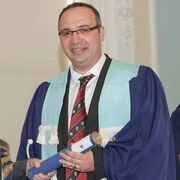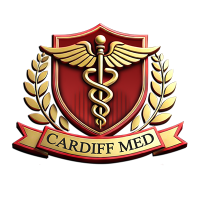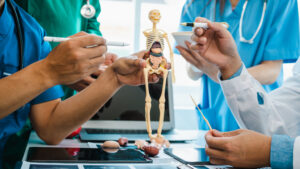MSc in Orthopaedics
Gain advanced orthopaedic skills with our fully online MSc Orthopaedics. Elevate patient care & clinical practice
Overview
Orthopaedics is a high-impact speciality where interventions like joint replacements and fracture treatments restore mobility and transform lives. Our flexible, 100% online MSc in Orthopaedics equips healthcare professionals with advanced knowledge of musculoskeletal conditions, evidence-based treatments, and collaborative care strategies.
With MSK cases making up 20% of GP visits and 30% of A&E attendances, this programme meets the rising demand for skilled orthopaedic practitioners ready to innovate and improve patient outcomes.
Entry Requirements
Our distance learning MSc in orthopaedics is conducted entirely online and is accessible to both UK and international registered healthcare professionals.
Applicants will typically hold a first degree or equivalent (including international qualifications) in a relevant professional healthcare or management field.
Registered healthcare professionals or experienced managers working in the healthcare field, without these recognised qualifications, will be considered on an individual basis, and a wide range of prior experience may be taken into account. In some cases, applicants may be asked to submit a piece of work for assessment to confirm that they can work comfortably at a postgraduate level and demonstrate the requisite clinical and professional knowledge.
- A copy of your updated CV including your address and date of birth.
- A copy of your undergraduate degree certificate.
- The name and email address of someone who is able to provide a reference, this can be a work colleague, employer or former tutor.
- A detailed personal statement explaining why you would like to undertake the course.
- A copy of your proof of English competency (see below).
Proficiency in the English language is also essential to completing our courses. If English is NOT your first language, we ask for proof of competency during the application process. We are able to accept an IELTS (with an overall score of 6.5 and a minimum of 6.0 for each band) or an equivalent qualification.
If you do not meet these requirements, please don’t worry, you can also contact our admissions team on admissions@cardiffmed.com for more information on the qualifications we accept.
Should you have already successfully completed the 1 year Postgraduate Diploma and wish to convert to the MSc and complete only the second year of the program this is possible. Please contact our admissions department info@cardiffmed.com to find out more.
Key Facts
- Awarding University
- Starting Date: 1st September 2025
- Application Deadline : 29th August 2025
- Class Size : 15 - 20
- Duration : 24 months
- Commitment : Part-time
- Format : 100% Online
Course Fees
- Deposit for September 2025: £750 †
- Total Course Fees for UK & International Students for September 2025: £8,400 ††
Payment Options
- Option 1: Upfront Payment in full. Pay-in-full discount is available.
- Option 2: Apply for Interest-free payments each month for the duration of the course.
Payment Plan Breakdown
First Year Payments
| Deposit | 10 Monthly Payments | Final Payment |
| £750 † | £340 | £350 |
Total first year payments: £4,500
Second Year Payments
| 11 Monthly Payments | Final Payment |
| £325 | £325 |
Total second year payments: £3,900
You may also be interested in:
- Spread the cost with Lendwise, who offer financing options for up to 8 years. ††††
† Deposits are non-refundable
†† Prices are subject to review following each intake
†††† Subject to eligibility criteria.
Course Modules and Learning Outcomes
The Orthopaedics MSc is a two-year course, consisting of eight modules (180 credits) with the first 120 credits deriving from the Postgraduate Diploma. The second year of the MSc Orthopaedics starts with an initial 10-week online module that will develop skills in critical appraisal and knowledge of research methodologies. Students then complete the professional project module, which consists of a 1,500-word proposal and a 10,500-word professional project (dissertation).
Year 1
Module Aims:
To equip healthcare professionals with in-depth knowledge and understanding of the fundamental aspects of trauma and orthopedics, focusing on anatomy, biomechanics, the healing process, X-ray interpretation, and clinical examination techniques.
Module Summary
- Fundamentals of trauma and orthopedics
- Detailed anatomy relevant to T&O
- Biomechanics of musculoskeletal systems
- Healing processes of bones and tissues
- Principles and techniques of X-ray interpretation
- Clinical examination methods in orthopedics
Learning Outcomes
- Demonstrate a systematic understanding of anatomy, biomechanics, healing processes, X-ray interpretation, and clinical examination in trauma and orthopedics (T&O).
- Critically analyze and evaluate complex information and research findings related to advanced principles of trauma and orthopedic care.
- Apply advanced knowledge to clinical scenarios, in a range of settings, by synthesizing and interpreting complex findings that are communicated effectively for patient management within a multidisciplinary team approach.
Module Aims:
To equip students with an advanced knowledge and understanding of orthopedic trauma and emergencies. This module focuses on the principles and practices of managing acute injuries, emergency interventions, and post-traumatic care in orthopedics.
Module Summary:
- Introduction to orthopedic trauma and emergencies
- Classification and management of fractures
- Emergency care protocols and triage
- Surgical and non-surgical interventions
- Rehabilitation and post-traumatic care
- Case studies and practical applications
Learning Outcomes
- Demonstrate a critical knowledge and understanding of the principles governing the management of orthopedic trauma and emergencies, including comprehensive fracture classification and the application of rigorous emergency care protocols.
- Systematically analyze and critically evaluate complex trauma cases to develop and justify evidence-based management plans grounded in current evidence and best practices.
- Apply advanced knowledge of emergency interventions, including initial stabilization and appropriate surgical or non-surgical treatments.
Module Aims:
To equip students with an in-depth knowledge of paediatric orthopedics, focusing on both elective and trauma cases. This module aims to equip students with the knowledge and understanding necessary to diagnose, manage, and treat orthopedic conditions in children.
Module Summary:
- Introduction to paediatric orthopedics
- Common elective orthopedic conditions in children
- Trauma-related orthopedic injuries in children
- Diagnostic methods and imaging techniques
- Surgical and non-surgical treatment options
- Postoperative care and rehabilitation
Learning Outcomes:
- Critically apply a systematic understanding of the principles and practices of pediatric orthopedics to a range of settings, encompassing both elective and trauma-related conditions.
- Critically appraise and synthesize information from clinical assessments and imaging studies to formulate and justify advanced management plans for paediatric orthopedic patients.
- Apply and critically evaluate advanced clinical skills in diagnosing, treating, and managing paediatric orthopedic conditions, ensuring evidence-based practice and patient-centered care.
Module Aims:
To equip healthcare professionals with an advanced understanding of the spine, covering both trauma and elective conditions, with an emphasis on diagnosis, management, and treatment strategies.
Module Summary:
- Anatomy and Biomechanics of the Spine
- Pathophysiology of Spinal Trauma
- Elective Spinal Conditions
- Diagnostic Imaging of the Spine
- Surgical Management of Spinal Conditions
- Non-Surgical Management and Rehabilitation
Learning Outcomes:
- Critically evaluate the latest research and evidence-based practices related to the anatomy, biomechanics, pathophysiology, and treatment options for spinal conditions, both traumatic and elective.
- Critically implement knowledge into a patient-centered approach to diagnose, manage, and treat a variety of spinal conditions, considering the individual’s needs, preferences, and overall well-being.
- Demonstrate advanced critical thinking and problem-solving skills that may be applied when integrating diagnostic imaging interpretation, developing comprehensive treatment plans, and implementing evidence-based rehabilitation strategies for spinal conditions in a range of multidisciplinary settings.
Module Aims:
To equip students with an advanced understanding of the anatomy, pathology, clinical examination, and treatment modalities related to the upper limb in the field of orthopedics.
Module Summary:
- Detailed anatomy of the upper limb
- Common upper limb pathologies
- Clinical examination techniques for the upper limb
- Imaging modalities for diagnosing upper limb conditions
- Surgical and non-surgical treatment options
- Rehabilitation and post-operative care
Learning Outcomes:
- Demonstrate a comprehensive knowledge and understanding of the anatomical and pathological features of the upper limb, and critically evaluate the latest research and evidence-based practices relating to clinical and imaging techniques used in diagnosis and treatment.
- Critically evaluate the latest research and evidence-based practices related to upper limb conditions and their management.
- Select and adapt appropriate advanced problem solving strategies, and clinical examination methodologies to interpret complex imaging results to design patient-centered treatment plans for upper limb disorders, applying a shared decision-making approach.
Module Aims:
To equip students with an advanced understanding of the anatomy, biomechanics, pathophysiology, and clinical management of conditions affecting the lower limb, including the hip, knee, ankle, and foot.
Module Summary:
- Anatomy and Biomechanics of the Lower Limb
- Common Injuries and Conditions of the Hip
- Common Injuries and Conditions of the Knee
- Common Injuries and Conditions of the Ankle and Foot
- Surgical Treatment Options for Lower Limb Conditions
- Non-Surgical Treatment and Rehabilitation
Learning Outcomes:
- Demonstrate a comprehensive knowledge and understanding of the anatomical, biomechanical, and pathological aspects of lower limb conditions, and the principles of their management.
- Critically analyze complex clinical cases involving the lower limb, systematically evaluate the latest evidence-based treatment options, and collaborate effectively with multidisciplinary teams to construct patient specific treatment and management strategies.
- Synthesize advanced clinical assessment skills to conduct comprehensive clinical assessments of lower limb conditions, critically interpret diagnostic imaging, and formulate evidence-based treatment plans in a range of multidisciplinary settings.
Year 2
Research Methodologies and Critical Appraisal-
- Terminology used in epidemiology and research studies such as prevalence, incidence, sensitivity, specificity, false positive and false negatives.
- Interpreting graphical representation of epidemiological and statistical data such as Kaplan-Meier curves, forest plots and meta-analyses.
- Calculations used in the assessment of research data such as relative risk, absolute risk and number needed to treat. Statistical tests and their applications including t-tests, ANOVA and chi-square.
- Qualitative research methods.
- Fundamentals of evidence-based practice and its application into the clinical setting.
- Principles of health economics, audit and quality improvement/assurance systems.
- Establishing patient registers and the value of disease-specific registers.
- Research into educational principles for both healthcare practitioner and patient.
Professional Project-
This module will depend on the creation of a piece of work based upon a specific clinically related project relevant to the student’s practice. This project may comprise:
- Literature review and appraisal of the evidence.
- Audit of practice including organizational or clinical.
- Review and implementation of evidence-based practice.
- Qualitative or quantitative research (formal research involving human subjects is not anticipated).
- Case(s)-based and quality of service review with critical appraisal.
- Case report, review of literature and organizational assessment.
Learning outcomes:
- Select and apply different methodological perspectives and tools to answer research questions in the field.
- Critically analyze and interpret relevant research in the subject area.
- Design and undertake a research/development project.
- Critically evaluate practice and suggest improvements or change.
- Incorporate knowledge of the research process in developing services appropriately.
Programme Leader
The hospital plays a statewide services includes the Acquired

Dr Firas Arnaout
Programme Leader
Validating partner
University of Buckingham
Assessment Methods
This programme emphasises learning through active participation in case-based discussions, reflection, and real-life scenarios. Students engage with clinical cases that mirror everyday practice, fostering problem-solving and evidence-based application from the very beginning.
Across the modules, assessments are integrated with learning. Each week, you will work through two to three clinical cases, discussing and reflecting on them with peers under the guidance of an expert tutor. These discussions form the core of your learning and are also the basis for your assessments.
Our innovative teaching methods are designed to help you translate this learning into real-world clinical practice. You’ll need to regularly log in to participate in discussions, ideally on a daily basis, and commit approximately two hours per day to your studies. Our dedicated Student Support Team is available to assist with any challenges you may encounter, from navigating our online platform to managing deadlines.
How Foundational Knowledge is Developed
The programme is structured so that foundational knowledge is introduced through carefully designed clinical cases. Each case is crafted to highlight essential concepts and progressively deepen your understanding as you apply critical thinking and evidence-based analysis. This hands-on approach ensures that you are not only acquiring theoretical knowledge but also learning how to apply it in a practical, clinical setting.
This programme is suited for professionals who thrive in an online, discussion-based learning environment. Please note that this course focuses on interactive, applied learning through peer collaboration and case discussions. You will be fully supported, encouraged and led through the programme to success and graduation!
Year 1
- Every week students are presented with two/three clinical case-based scenarios that are reflective of every day clinical practice and research.
- Tutors will post a number of questions and prompts to aid students in a formal discussion of each case.
- These discussions are facilitated throughout by your tutor and are then assessed at the end of every module.
For this assessment, students will work on a group assignment and/or an individual assignment.
- Group assignments are designed to hone skills in the multidisciplinary, holistic approach to modern treatments and patient management by requiring group participation in a single piece of work.
- Individual assignments are designed to hone skills in academic career progression through such tasks as reviewing papers, developing scientific posters or abstracts, peer-reviewing, social media activities, patient information leaflets and essays.
The reflective journal is used by students throughout each module to monitor personal progress. This is guided by weekly feedback from your tutor and is graded at the end of every module. The journal typically includes the following:
- Initial expectations and reasons for taking the course.
- Module and/or personal learning objectives.
- Description of events, issues and learning points within current personal practice.
- Change in every day practice due to knowledge gained on each module.
- A description of what has been learned during the module.
- Students are provided with case-based problems in the form of a one-hour timed examination.
- The exam consists of 30 'Single Best Answer' questions.
- Students are required to complete the exam online within the set time.
Year 2
This module runs over an 8 week period and is designed to develop skills in critical appraisal and knowledge of research methodologies. The module consists of mandatory formative assessment activities to support your learning and development prior to the Professional Project module.
Students will work with their supervisor to submit a professional project proposal for their chosen topic.
Students will deliver an abstract (1000 words) outlining their proposal and, if deemed necessary, develop and submit documentation for the University’s ethical committee approval.
- Students will create a dissertation, the theme of which has been developed in discussion with their tutor.
- Supervision will normally involve direct online support involving planned progress, supporting research activity and reading student work.
- Supervisors and students will agree on a communications plan, which may involve emails or online chats. Some students may employ the use of freely available chat or audio conferencing facilities for live discussion with supervisors.
- Students will have access to online forums where they can develop their research capabilities together.
- All communications with tutors will be logged on the Professional Project forum by the student, and consist of brief summaries of discussion.
Why Study Orthopedics Master's with CardiffMED
100% Flexible
Our courses are 100% online. No fixed study times mean you can log in and learn whenever and wherever.
Multidisciplinary – study in a group of doctors, nurses, pharmacists and other healthcare professionals.

Career Boosting
Get a University-validated postgraduate qualification in just 1 calendar year instead of 2 academic years.
40% of our alumni reported a salary increase 2 years after studying with us.

Expert Led
All of our programmes are authored and developed by world-leading experts in their field.
Our faculty are selected due to their subject expertise, experience, and teaching abilities to ensure the highest standards of educational excellence.

This online Orthopedics course is aimed at:
Nurses- Enhance skills for when working in wards, dealing with orthopedic issues in a range of settings. Gain a better understanding of the subject to better treat patients within the field. Address shortage of specialists in the subject area, caused by the COVID-19 pandemic.
Doctors- Widen portfolio of medical expertise to further career opportunities within the discipline of orthopedics. Gain in-depth knowledge of the latest surgical and biomechanical techniques to meet local, regional and national needs for managing orthopedic trauma. Address shortage of specialists in the subject area, caused by the COVID-19 pandemic.
Our target market is not limited to the categories mentioned above, and all those who wish to learn how to apply the fundamentals of orthopedics to benefit suffering patients.
Medical graduates (in related fields such as Biomedical Science and/or Dietetics): Following the completion of this program students will be able to extend their knowledge and understanding of the specialty of orthopedics, while furthering their career progression opportunities.
Anesthetists: The successful completion of this program would further the individuals understanding of orthopedics, and would aid in their career advancement. While there is no subspecialty for orthopedic anesthesia, the individual would be able to list it as a special interest.
Operating department staff and allied health professionals: The successful completion of this programme would allow operating department staff and allied health professionals to further their knowledge surrounding orthopedics, which would increase their ability to effectively treat and assist any patients.
Surgical Care Practitioners (SCPs)
Assisting in Surgery: SCPs assist orthopedic surgeons during operations, helping to increase the number of surgeries that can be performed and ensuring high standards of care during procedures.
Patient Management: They also manage pre- and post-operative care, reducing the burden on surgeons and ensuring continuity of care.
International practitioners: Following the completion of this programme international practitioners would have an increased knowledge of common orthopaedic conditions, such as musculoskeletal disorders. This will aid in their diagnosis, treatment and care of patients who otherwise would not be able to access treatment due to a shortage of Orthopedic surgeons in their area.
You'll learn through our flexible, interactive online platform, which allows you to engage with clinical cases, complete assignments, and collaborate with fellow students at times that suit your schedule. There's no fixed timetable—simply log in daily to participate in the week's activities.
Our teaching approach is highly interactive, using small groups of 10-20 students to foster a collaborative environment where you can engage in thoughtful discussions and receive guidance from your tutor. You'll have access to learning resources and discussion forums that encourage ongoing interaction and deeper engagement with the material.
Throughout your studies, you'll receive support from a dedicated expert tutor and our Student Support Team, ensuring you have the resources needed to navigate the course successfully.
Why Enroll in This Program
Awarding University
University of Buckingham
Why CardiffMED Orthopaedics Master's Program
Gain advanced orthopaedic skills with our fully online MSc Orthopaedics. Elevate patient care & clinical practice.





